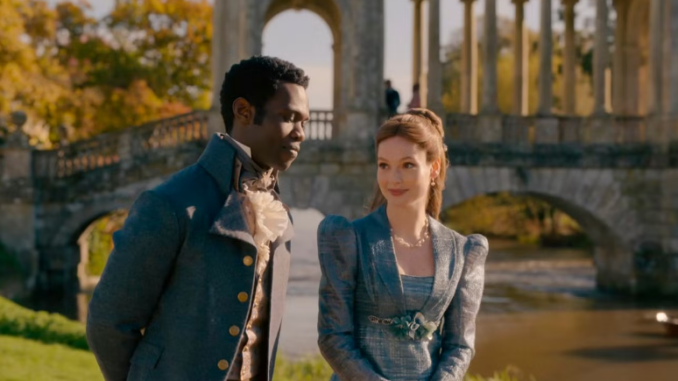
Introduction: A Clash of Perspectives in Bridgerton Season 3
Bridgerton season 3 isn’t just about romance; it dives into family dynamics, particularly the subtle but telling conflict between Violet Bridgerton and her daughter Francesca. While Violet has long been portrayed as the wise and loving matriarch, her interactions with Francesca in this season expose a deeper flaw in her character: an inability to see beyond her own ideals about love and happiness.
Francesca’s Unique Love Story in Season 3
Francesca’s Storyline Breaks the Bridgerton Formula
Unlike the typical Bridgerton sibling arc, Francesca’s story takes a more unconventional path. Her quiet, pragmatic courtship with John Stirling contrasts sharply with the dramatic love stories of her siblings, and this divergence sets the stage for Violet’s discomfort.
Violet Pushes for a “Thrilling” Romance
Throughout the season, Violet insists Francesca should pursue a passionate and electrifying romance, reminiscent of her own. From orchestrating awkward introductions to encouraging “sparks,” Violet’s meddling borders on overbearing. Her well-meaning efforts only alienate Francesca, who is content with her grounded and tranquil relationship.
Violet’s Perspective: A Romantic Idealism
Violet’s Vision of Love Shapes Her Parenting
Having experienced a love match herself, Violet naturally wants the same for her children. She views romantic love as the pinnacle of fulfillment, a belief she instills in all her offspring. However, this idealism blinds her to their individual needs and desires.
The Flaw in Violet’s Philosophy
While her intentions are loving, Violet fails to recognize that not everyone values love in the same way. Her insistence that all her children replicate her experience reveals an inability to accept differing perspectives, especially when it comes to Francesca’s quieter, more pragmatic approach to marriage.
Francesca’s Journey: A Quiet Rebellion
A Marriage of Mutual Respect
Francesca’s relationship with John is built on mutual understanding and shared values, not fiery passion. This choice reflects her calm and introverted nature, which contrasts with Violet’s romanticized expectations.
Francesca’s Subtle Defiance
By choosing a path that prioritizes her peace of mind over societal pressures, Francesca challenges Violet’s worldview. Her decision highlights the growing tension between individual fulfillment and parental expectations.
Violet’s Struggle to Adapt
A Mother’s Fear of Mistakes
Violet’s hesitation to accept Francesca’s choices stems from a fear that her daughter might regret settling for less-than-ideal love. This fear often manifests as unwarranted interference, creating friction in their relationship.
Overcoming Generational Differences
As Francesca asserts her independence, Violet is forced to confront the idea that happiness doesn’t look the same for everyone. This realization, while uncomfortable, paves the way for personal growth.
The Broader Implications for Bridgerton
How Violet’s Philosophy Affects the Family
Violet’s romantic idealism doesn’t just impact Francesca; it shapes the dynamics of the entire Bridgerton family. Her expectations often place undue pressure on her children, pushing them toward choices that may not align with their true desires.
Eloise and Benedict: More Clashes Ahead?
Other Bridgerton siblings, like Eloise and Benedict, also challenge Violet’s traditional views. Eloise’s intellectual pursuits and Benedict’s artistic ambitions highlight the growing divide between their priorities and Violet’s expectations.
Francesca’s Neurodivergence: A Layered Complexity
A Quiet Need for Stability
Many fans interpret Francesca as neurodivergent, which adds depth to her preference for a calm and stable marriage. Violet’s inability to fully understand this aspect of her daughter underscores the generational and cultural gap between them.
Breaking the Mold in a Restrictive Society
Francesca’s choices represent a quiet rebellion against the rigid societal expectations of Regency England. Her insistence on marrying for peace rather than passion challenges the status quo, making her one of the most complex characters in the series.
The Narrative Bias Toward Violet
Why Violet Always Seems “Right”
The structure of Bridgerton inherently supports Violet’s perspective, as each sibling eventually finds the grand love story she envisions. This narrative bias often overshadows the individuality of characters like Francesca.
A Missed Opportunity for Nuance
By framing Violet as the ultimate authority on happiness, the show risks undermining the diversity of its characters’ experiences. A more balanced portrayal could add depth to the series.
The Potential for Growth in Bridgerton’s Future
Challenging Violet’s Philosophy
As the Bridgerton siblings continue to forge their own paths, future seasons could explore Violet’s growth as she learns to embrace their individuality. This evolution would not only humanize Violet but also enrich the show’s portrayal of family dynamics.
Francesca and Michaela: A New Challenge
Francesca’s eventual relationship with Michaela offers an opportunity to further challenge Violet’s worldview. Seeing Violet navigate her own biases and adapt to a new kind of love story could be a compelling arc.
Conclusion: Bridgerton’s Strength Lies in Its Complexity
Francesca’s storyline in Bridgerton season 3 exposes cracks in Violet Bridgerton’s seemingly perfect maternal wisdom. As the show progresses, embracing these imperfections and exploring the unique paths of each character will only make the series more compelling. After all, true happiness is as diverse as the Bridgerton family itself.
FAQs
- Why is Francesca’s storyline so unique in Bridgerton season 3?
Francesca’s quiet and pragmatic approach to love contrasts with the dramatic romances of her siblings, challenging traditional narratives. - What is Violet Bridgerton’s main flaw as a character?
Violet’s romantic idealism often blinds her to the individuality of her children’s desires and priorities. - How does Francesca’s neurodivergence add depth to her character?
It highlights her need for peace and stability, making her choices stand out in a society focused on passion and spectacle. - Will Violet’s perspective change in future seasons?
Likely, as the Bridgerton siblings continue to challenge her views, Violet may grow to accept and respect their unique paths to happiness. - What makes Francesca and Michaela’s relationship significant?
It offers an opportunity to explore new dynamics and challenge Violet’s traditional beliefs about love and family.
